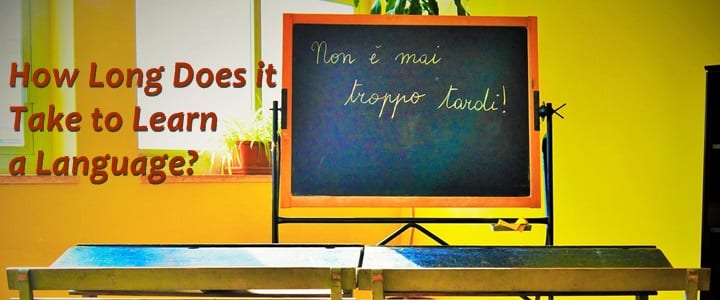These days, almost everyone has an excellent reason to learn a language. International business, cross-cultural friendships, and multi-country travel have made language proficiency a common goal.
Many people on the path to fluency find themselves asking, “How long does it take to learn a language?” In this blog post, we’ll share some interesting statistics, but also a few reasons why there might not be a clear-cut answer.
How Long Does it Take to Learn a Language?
What the Experts Say
First, let’s take a look at the statistics. The U.S. Foreign Service Institute conducted a study to determine the answer. The result: the key factor in determining how long it will take you to learn is how different your target language is from your native language.
For languages like French, Spanish, and Italian, which are among the most similar to English, it will take between 575-600 hours to achieve a level of “General professional proficiency.” On the other end of the spectrum, languages like Arabic and Japanese will take around 2,200 hours.
While these numbers might seem intimidating, they are actually completely within reach with the right tools, plan, and some determination!
Factors that Affect Language Learning
While the statistics above are helpful references, the fact is that the speed of your language acquisition is affected by a number of factors. Language learning is highly personal based on your previous knowledge, your learning style, your preferences (group classes, individual lessons, online, or in-person), and more.
Here are some of the main factors that will affect how long it takes you to learn a language.
Your Learning Style
Some students learn quicker than others, either because they’re on a timeline or, they might just be better at striking up conversations with native speakers. Other students prefer to study at a slower pace, attending weekly classes and completing homework in between. And of course, every student’s level of motivation and determination is different.
Your Experience With Languages
Are you already bilingual? If so, you’re probably already familiar with how to study a new language, and it will come more naturally to you. Bonus points if you’re learning a language that’s in the same “family” or category of languages.
For example, if you already know Spanish, then French and Italian will be easier for you. If you already know Hebrew, then Arabic will be much more familiar.
Method of Learning
For as many reasons as there are to learn a language, there are easily as many ways to learn a language. Language learning methods are exponentially growing, and that’s a good thing!
The method you choose can greatly affect your pace of learning. If you choose an in-person, intensive course, you’ll make rapid progress. On the other hand, less frequent group classes or simply using a language learning app will likely take longer to yield the same result.
SEE ALSO: How to Make Learning a Language Easier and Faster
Amount of Time Spent
Language learning takes practice. The more time you’re able to dedicate to it, the quicker you’ll learn. Keep in mind that language learning doesn’t only occur in the classroom. You’ll also need time for practice exercises or homework, listening to audio recordings or music, watching videos, and interacting with speakers of the language through immersion or travel.
The Language You’re Learning
As noted above, the language you’re learning can be the difference between 24 weeks and 88 weeks of language instruction to reach the same level of proficiency. While it’s not the only thing you should take into consideration, it’s an important fact to consider when choosing a language to learn.
Now, Here’s the Fastest Way to Learn a Language…
Now that you know approximately how long it will take you to learn a language, here are a few tips to further minimize the time you’ll spend on the path to fluency. We’ll also share some things to avoid that will actually prolong your language learning.
Tips & Tricks to Learn Faster
- Be Consistent – Create a regular schedule for study time, and stick to it! Languages require constant reinforcement, so to progress faster, don’t let your study time slide.
- Find the Right Teacher – Choosing a teacher who understands your unique learning style makes a big difference.
- Stay Motivated – Remind yourself why you’re learning the language often, and keep it in your mind as you work toward your goal.
- Have Some Variety – Instead of just sticking to your textbook, embrace the variety of opportunities there are to practice your language – including movies, music, and apps!
- Plan Ahead – With a clear plan right from the get-go, you’ll be able to avoid distraction or forgetfulness in your study sessions.
What NOT To Do
- On and Off Language Learning – Many language learners lose momentum in their learning because they start and stop too often. Don’t let that be you! Commit to your language study and you won’t regret it.
- Neglecting Homework or Practice – Lessons or classes will greatly aid your learning, but don’t forget to do your homework! Regular practice outside of class is essential to make quicker progress.
- Getting Stuck in Beginner’s Land – Hesitation is a common feeling among beginners, but in order to advance, you can’t be afraid to strike up conversations with native speakers, speak up in class, or look for other opportunities to engage in your target language.
Language learning is a unique journey for everyone, but by following these suggestions, you should be able to learn faster. The best way to get started today is with the guidance of an experienced language teacher. Learning on your own can yield some progress, but without someone to listen to and correct you, you’ll be making errors you can’t identify on your own.
A competent, qualified teacher can guide you in the right direction and introduce concepts, vocabulary, and grammar at just the right time for you. Check out TakeLessons Live for free online classes. Get started today and you’ll be speaking your target language before you know it!
 Post Author: Joan B.
Post Author: Joan B.Joan B. lives in Carmichael, CA and has been teaching high school Spanish for more than 18 years. A lover of language, she’s studied French, Arabic, and Italian and spent time living in Spain. Learn more about Joan here!
Jessica Dais

